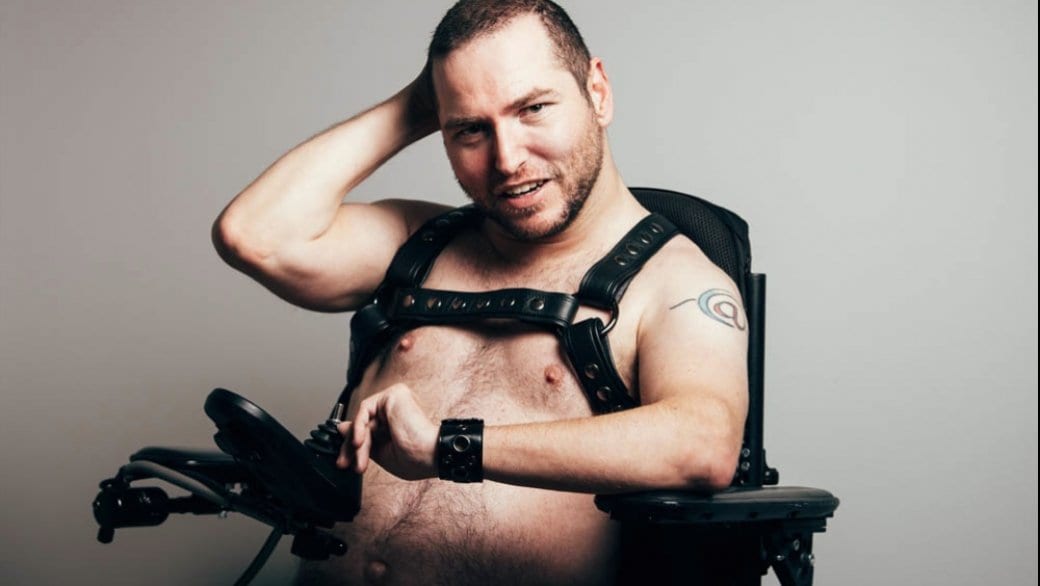For Andrew Gurza, a queer man who has cerebral palsy and uses a wheelchair, it’s become a mission to bring the topic of disability into popular culture.
“I want to have that conversation with different communities and talk about how they feel about disabilities,” he says.
Gurza was the keynote speaker at an interactive discussion on sex and disability in the queer community, hosted by Health Initiative for Men and Mpowerment on Feb 29, 2016.
Here are a few of the topics he discussed:
Disclosure of disability on gay dating apps
Gurza always includes mention of his disability in his profile on gay hookup apps.
“I have many times not disclosed just to see how different people would react to it,” he says, “but I found that by doing that I was not being truthful to myself.”
He chooses to be upfront about his disability in part, he says, to avoid the emotional turmoil of rejection from potential dates.
“I’m really trying to open up a dialogue with them previously so by the time they get to the door to fuck me they know exactly what they are getting,” he says.
“I do my best to assuage their fears because I can understand why they might be a little bit afraid. If my partner had four arms I might be a little bit, ‘okay how exactly do I do this? Please tell me. You can throw me up against the wall but what else can you do?’”

(Andrew Gurza is founder and co-director of Deliciously Disabled Consulting, described as “a company, brand and movement that aims to make the lived experience of disability accessible to pop culture.”/deliciouslydisabled.org)
Myths about disability and sexuality
“As much as I’d like to fuck you up against the wall, that’s just not a part of my reality,” Gurza says.
But, he quickly adds, “there are so many things I can do that other people can’t.”
There’s the fear of accidentally hurting him that he’s quick to dispel: “One of my favourite things that I hear from guys all the time is, ‘oh, I’ll hurt you. I can’t get on top of you because I’ll break something.’
“My response is: if it hurts I’ll say ‘ow’ or ‘stop.’”
Some guys also seem afraid they’ll have to take care of him, he says.
“There are things you may have to do for me during the encounter where I’ll not call my attendant because of issues around attendant care and privacy and wanting to have a moment that is just for me and a partner,” he says. “You may have to do some things for me but by no means will you become my primary caregiver. Fuck no! I may want you to just fucking go, thanks!”
Gurza also rejects the notion that disabled people are all bottoms. “I always go, ‘well, no, I’m not but I’m not a top either,’” he says. “I don’t want to constrict myself to these binaries that are not accessible to me.”

(Andrew Gurza stars in a documentary short about LGBT sex and disability called Bedding Andrew, directed by Blair Fukumura./Still from Youtube trailer)
Disability and sex work
Another big myth, he says, is the idea that disabled people need to hire sex workers in order to receive sexual pleasure.
“Now, I think sex work is great and I have a lot of respect for people who are in the industry but I don’t think it’s fair for this idea that a sex worker is my saviour,” he says.
Realities of sex and disability
Gurza says sex with a disabled person can require a lot more communication about what’s possible and how to best go about it.
“There’s more and more conversation where you’re storyboarding your sex: where you take your partner before you do anything and you sit down and talk, draw, mime, whatever you choose to do about the sex,” he explains.
He says this also provides a non-disabled person an opportunity to share their own feelings about the encounter. “They deserve space to discuss that,” he says, “and this can make the sexual experience that much hotter.”

(“Imagine having to call your attendant to say, ‘Hi, are you free right now? Yeah, I’d like to uhm, masturbate. Do you think you could just come and just set me up?’”/HZD Photography)
Masturbation
Gurza says masturbation is not a solo experience for him. His disability, he says, prevents him from pulling his pants down without assistance.
“Imagine having to call your attendant to say, ‘Hi, are you free right now? Yeah, I’d like to uhm, masturbate. Do you think you could just come and just set me up?’
“And then they go, ‘Cool. I leave in 20 minutes. Be done! Bye!’”
Imagine setting a timer. “You should have come by now!”
He says many disabled people fear asking for help. “Asking to access your own body can really have an effect on how we as queer men, queer people with disabilities, engage their own bodies. It can be really hard to do that.
Visibility in mainstream queer culture
Gurza laments the lack of visibility of queer people with disabilities in queer culture.
“When you go look at magazines, in porn, in all of these different avenues where queer men access their sexuality, you don’t see that because I defy definitions of what it means to be, in my case, a queer man,” he says.
“I’ll never be able to go to the gym and work off my disabilities.”

 Why you can trust Xtra
Why you can trust Xtra


